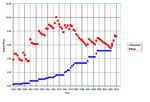Prison Aid to Haiti for Captive Slave Labor
By Dady Chery Haiti Chery Haiti’s incarceration rate of roughly 100 prisoners per 100,000 citizens in 2016 was the lowest in the Caribbean. Nevertheless, there is a systematic campaign underway for more prisons. Canada and Norway have each given one … Continue reading →









